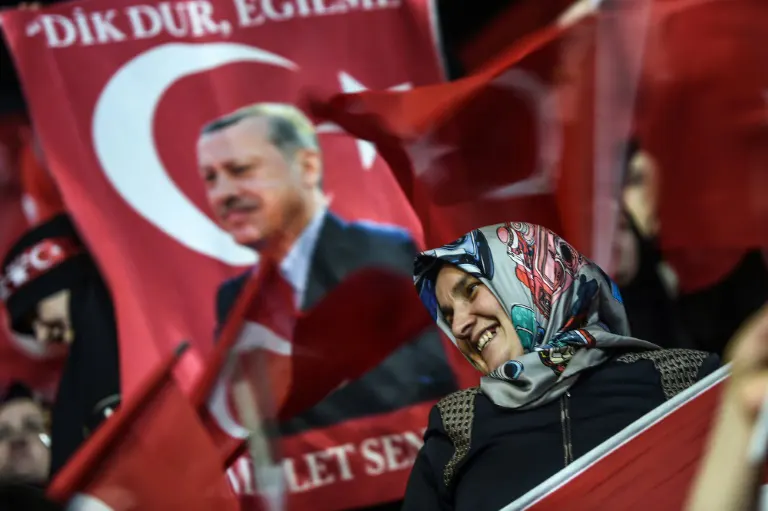Turkish President Recep Tayyip Erdogan next Sun-day puts his two-decade legacy on the line in a knife-edge vote against a powerful alliance built on anger over economic hardship and his authoritarian turn.
The 69-year-old has become one of Turkey’s most important and divisive leaders since his Islamic-rooted party ended half a century of secular rule and launched an era of social transformation.
Turkey became a strategic player with a vibrant economy and a modern army of drones that shifted battlefields in wars stretching from Libya to Ukraine.
Erdogan’s global stature soared when he helped stem Europe’s migrant crisis in 2016 — and then plunged when he unleashed a crackdown on dissent later that same year.
He enters one of the biggest elections of Turkey’s modern era with his popularity weighed down by a crippling cost-of-living crisis and the social after-shocks of a February earthquake that claimed more than 50,000 lives.
The real possibility of defeat has seen Erdogan defiantly turn to sharply polarising themes that have given the polls a powder keg feel.
He accuses the West of funding his “pro-LGBT” rivals and portrays himself as a defender of conser-vative values against attacks by foreign “terrorists”.
The increasingly febrile atmosphere prompted opposition leader Kemal Kilicdaroglu to ask sup-porters to stay home if they win.
“If we go out, there may be riots, armed people may take to the streets,” the 74-year-old secular opposition leader warned.
‘Political coup’ –
The nation of 85 million appears as splintered as ever about whether Erdogan has done more harm than good in the only Muslim-majority country of the NATO defence bloc.
The entry of two minor candidates means that Erdogan and Kilicdaroglu will likely face each other again in a runoff on May 28.
But some of Erdogan’s more hawkish ministers are sounding warnings about Western efforts to undermine Turkey’s might through the polls.
The parliamentary and presidential polls will see Erdogan face a six-party alliance that crosses Tur-key’s vast political spectrum and includes some of his former allies.
Interior Minister Suleyman Soylu has repeatedly referred to US President Joe Biden’s 2019 suggestion that Washington should embolden the opposition “to take on and defeat Erdogan”.
“July 15 was their actual coup attempt,” Soylu said of a failed 2016 military putsch that Erdogan blamed on a US-based Muslim preacher. “And May 14 is their political coup attempt.”
Splintered society –
Erdogan continues to be lionised across more conservative swathes of Turkey for unshackling religious restrictions and bringing modern homes and jobs to millions of people through construction and state investment.
Turkey is now filled with hospitals and inter-connected with airports and highways that stimulate trade and give the vast country a more inclusive feel.
He empowered conservative women by enabling them to stay veiled in school and in civil service — a right that did not exist in the secular state created from the Ottoman Empire’s ashes in 1923.
And he won early support from Turkey’s long-repressed Kurdish minority by seeking a political solution to their armed struggle for an independent state.
But his equally passionate detractors point to a more ruthless streak that emerged with the violent clampdown on protests in 2013 — and became even more apparent with sweeping purges he unleashed after the failed 2016 coup attempt.
Erdogan turned against the Kurds and jailed or stripped tens of thousands of people of their state jobs on oblique “terror” charges that sent chills through Turkish society.
Polls show younger voters who have no memo-ries of the corruption and economic crises that rav-aged Turkey before Erdogan’s rise preferring Kilicdaroglu by a two-to-one margin.
Democratic traditions –
Erdogan’s biggest problems started when he de-cided to defy the rules of economics by slashing interest rates to fight inflation in 2021.
The lira crashed and inflation hit an eye-popping 85 percent since his experiment began. Millions lost their savings and fell into deep debt.
Polls show the economy worrying Turks more than any other issue — a point not lost on Kilicdaro-glu.
The retired civil servant pledges to restore eco-nomic order and bring in vast sums from Western investors who fled the chaos of Erdogan’s more recent rule.
Kilicdaroglu’s party will send out 300,000 moni-tors to Turkey’s 50,000 polling stations to guarantee a fair outcome on election day.
A Western diplomatic source pointed to Turkey’s strong tradition of respecting election results. Erdogan’s own supporters turned against him when the Turkish leader tried to annul the opposi-tion’s victory in 2019 mayoral elections in Istanbul..—AFP










